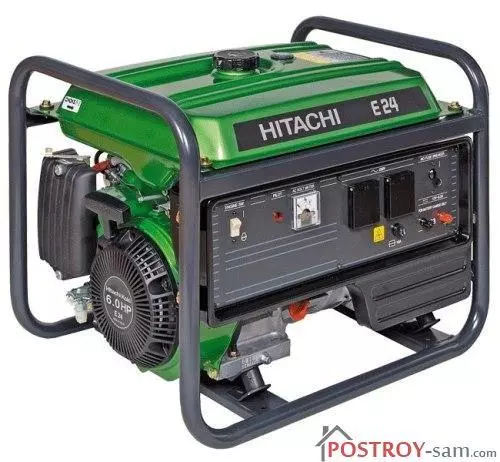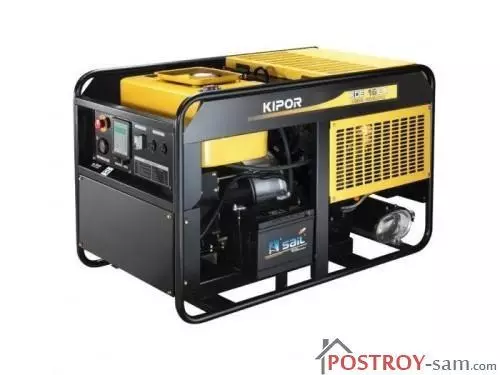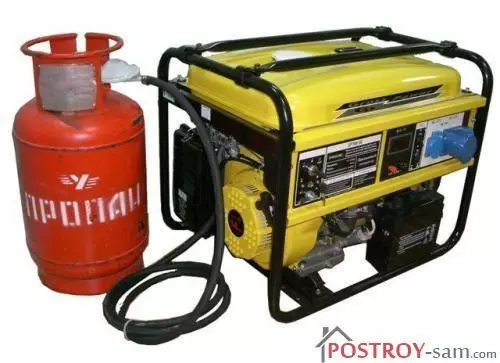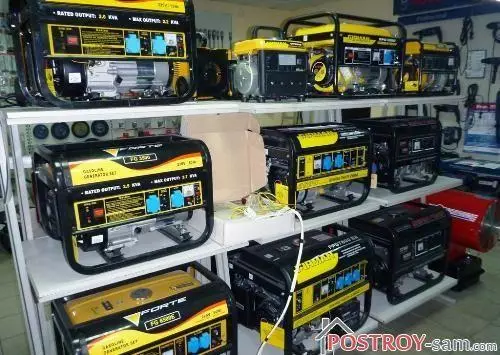
Gasoline generator - two and four-stroke models

The two-stroke engines device is much easier than four-stroke, since there is no lubricant and gas distribution system in their designs. The production of two-stroke engines costs pretty cheap, and therefore on the market these engines have a fairly low price. Due to the small number of clocks, high overclocking dynamics are provided.
But at the same time, their structural simplicity is the cause of some negative characteristics. For example, filling the two-stroke engine is necessary for a special mixture of gasoline and oil in a certain proportion. Each time before refueling, it will not be far from refueling the ratio of the fuel mixture. In addition, when burning such a mixture, a highly toxic exhaust is formed, thanks to which all two-stroke engines have extremely low environmental characteristics, even despite the fact that they are equipped at the factory with special filters.
A two-stroke engine must be purned to the combustion chamber during operation, since it does not have valves that must distribute the fuel and air mixture. After each engine turnover, gas testing is removed from it, and this is accompanied by an emission of a part of a combustible mixture, which is why high fuel consumption appears during the work. Another minus the two-stroke engine is quite significant noise when working.
It may seem that the two-stroke engine must have a greater power compared to the four-stroke, judging by the working volume. But actually two-stroke engines have 50% lower power due to the fact that it has an inefficient purge system.
If the owner of the generator, equipped with a two-stroke engine, can close the eyes to the need for a constant calculation of the fuel mixture, a poisonous exhaust and tangible fuel consumption, then this lack will make it seriously think - the two-stroke engines have twice the smaller resource than four-strokes.
The advantages of four-stroke engines leak out of the disadvantages of the two-stroke. The presence of the lubrication system allows you to enter the oil to the system once and work on it without losses until its replacement is suitable. In the tank, the owner needs to fill only gasoline, without mixing it pre-with oil. Thanks to this, four-stroke engines are much cheaper in operation than the two-stroke.
Also four-stroke engines when working at idle and low revolutions, it is more stable, and their exhaust gases that are formed during gasoline burning are much less toxic than when combustion of gasoline with oil. Thanks to this, ecology is applied less damage. The resource of four-stroke engines is approximately 2000-2500 hours of operation.
Of the disadvantages of such engines, you can highlight the low dynamics of overclocking, large dimensions and weight, as well as a high price.
One of the most important advantages of generators for home and giving, which work on gasoline is their easy launch in cold weather at temperatures up to -20 degrees.
Article on the topic: Door opening mechanisms: types of structures and installation features
Fuel for gasoline generators
In the passport of any generator, the exact characteristics of oil and fuel, which must be applied. In modern models of gasoline generators, the neeethydrated gasoline of the A-92 brand is most often poured. In this case, there should be no suspension in gasoline, and it should be transparent. It is not necessary to use ethyl fuels, as well as gasoline, the octane number of which was overestimated with methanol. For the normal operation of the gasoline generator, the A-95 brand is not suitable, only the A-92 brand is needed.The generator that has a power of 5kW, fuel consumption is approximately 1.8 liters per hour, that is, with a tank of 10 liters, the generator will be able to work for about five and a half hours without a break.
Diesel generators

Then we will discuss the power plant, which consists of a diesel engine, generator, automation, control devices, fuel tank, as well as systems that distributes generated electricity. All this is placed on a common frame.
Diesel power plants may differ in constructive execution, that is, being in a casing that reduces noises, or without it. According to the characteristics, diesel power plants differ in frequency of current and in its voltage, power and current (three-phase variable or permanent).
Models having air cooling have a maximum power of 6 kW. These models have such operational characteristics that bring them closer to gasoline generators - the presence of continuous operation restrictions (about 8 hours), small size and weight. A diesel generator with air-cooled has a motor life of approximately 3,500-4000 hours, and this is about 70% more than that of a gasoline generator. Such a generator is very advocated to the quality of diesel fuel, it is more expensive than gasoline analogs and works very noisy.
There are also generators with a liquid cooling system in which oil or water is used. Diesel power plants cooled in this way are exceeded by some characteristics all other types of generators.
These advantages include:
- If there is a sufficient amount of fuel, able to work smoothly all year round;
- Depending on the model, the power varies from 5 kW to one megawatta;
- Motion is an average of up to 10,000 hours;
- Perhaps the presence of sound insulation casing.
Diesel generators have one general advantage - there is no flammable vapor in the spilling of diesel fuel, since the diesel fuel evaporates very badly in the air.
The disadvantages include:
- Pretty high price. Diesel generators having liquid cooling are three to four times more than gasoline analogs;
- For continuous operation of the generator, it is necessary that no less than 30% of its power consumed, otherwise its supercooling is possible;
- It is easy to run a diesel generator only at a temperature not lower than -5 ° C, and at lower temperatures, it will not be possible to start it without warming up;
- If the generator does not have a protective cover, then its work will be accompanied by very loud noise;
- Pretty considerable weight and sizes.
Article on the topic: how to make decorative bulk floors do it yourself
Diesel generators who have a liquid cooling system are most often operating in two modes - 3000 rpm and 1500 rpm. Engines having a rotor work at 3000 rpm and are more noisy. They also have a lower motor exercise than engines running at lower revs (about 5000-6000 hours) and cannot work around the clock, so they are used only as a backup.
5 kW diesel generator consumes approximately 1.8 liters of fuel per hour, it means a tank, a volume of 5.5 liters, is enough for only three hours of operation.
Gas generators for home and summer cottages

Power plants that operate on liquefied gas are powered by piston engine, which operates on the OTTO cycle. Gasoline engines that were described above are also working on the same cycle. Energy that is formed during fuel combustion rotates the shaft, which in turn is connected to the alternator, and the result of this work is the production of electric current.
Gas generators have a weight with gasoline power plants, and the type of cooling system is the same as in diesel generators of this power. Depending on the model, gas generators having a power of more than 6 kW can work not only on gaseous fuel (butane, propane, methane), but also on diesel or gasoline.
Advantages of gas generators:
- Less fuel consumption than in liquid fuel generators. Methane, propane and butane have an octane number greater than 100, so they have higher detonation resistance, which allows using a higher degree of compression;
- Prices for gas generators are similar to prices for diesel power plants having the same power;
- Power range from 0.8 kW to 9 MW;
- In place of the power plant can be installed both diesel engine and piston engine;
- The cheapest fuel and, accordingly, the smaller cost of kilowatts, which produces the generator;
- biogas can be used as fuel;
- These generators possess 30% large engines than gasoline and diesel counterparts. Gaseous fuel combines almost no residue, thanks to which the degree of wear of cylinders and the engine pistons is minimal. Motor oil burns with gas and leaves burning products after themselves;
- The resulting exhaust contains two times less hydrocarbons than in diesel or gasoline engines.
There are still advantages that are attributed to gas generators. Such advantages include the superiority on motorcycles at times, low operating costs, complete environmental safety, almost complete silentness and lack of vibrations. But these statements or fair partly, or are not incorrect, or they can only be applied to gas turbine generators. For example, the noise level depends mostly from the number of revolutions per minute and the existing type of cooling.
Disadvantages of gas generators:
- Additional measures must be taken to prevent the leakage of combustible gases, as they are fire and poisonous;
- In addition to buying the gas electric generator itself, it is necessary to purchase gearboxes and cylinders under gas, and their cost can often be comparable to the cost of the generator itself;
- Every 100 hours of operation, a complete oil change is required, since in the process of operation in the engine together with the gas flashes oil;
- At negative temperatures, liquefied gas evaporates very badly, so in the winter the electric generator must be contained in the warm room;
- It is possible to connect the gas power plant to the gas highway, but it is practically impossible to implement it;
- All generators who have liquid and air cooling can only be used as a backup power supply, since the first can work smoothly about 30 hours, and the second and only 6 hours are alone.
Gas generators with a capacity of 5 kW have a gas consumption of 1.5 kg in one hour when working with a load of 75%. Gas 50-liter cylinders contain 21 kg of gas, there is enough for the operation of the generator for 14 hours.
Manufacturers of generators and prices for generators

On the territory of Russia, the release of gas, diesel and gasoline generators has been established in two schemes: an assembly of imported components in the territory of the Russian Federation and the assembly in China, followed by the implementation in Russia under its own brand. The "Wear" generators produced in the first diagram, and on the second - the products of the brands of ProLab and "Svarog".
Article on the topic: Wall decoration with her own hands: Facing the crate
Among the products of Vepr and Co., you can find models that are equipped with gas, diesel and gasoline engines having a power of 1.5 to 320 kW. Prices for VEPER generators vary from 440 euros (single-phase gasoline generator with a capacity of 1.5 kW) to 75 thousand euros (three-phase diesel generator with a capacity of 380 kW). As part of the generators, Lombardini, Yanmar and Honda engines are most often used.
ProLab generators have power from 0.65 to 9 kW and price range from 4 to 83 thousand rubles, and the "Svarog" generators have a power of 2 to 16 kW and the price range from 12 to 340 thousand rubles. A company that sets engines to generators collected in China is unknown.
Among Japanese brands of generators are the most famous are Hitachi, Honda and Yamaha. On the generators who are produced under these brands, you need to pay special attention. Without a doubt they are the best generators from all presented in the Russian market, both to save fuel and in terms of performance and troubleshooting. But their main disadvantage is a very high price - 5 kW generator costs about 84 thousand rubles.
There are also many Chinese manufacturers of generators, among which Green Field and Kipor are allocated, which have proven themselves among the owners of the Russian real estate. Prices for data generators stratum stratum from 12.5 thousand rubles for 2 kW generator, and manufacturers themselves talk about "Honda technology". But many understand that Honda technology and Honda products are two big differences.
In addition to the above-described brands in Russia, you can find products of American and European production - Generac, SDMO, Geko, Hammer, Gesan and FG Wilson. The average cost of such generators is approximately 55 thousand rubles per 5 kW generator.
